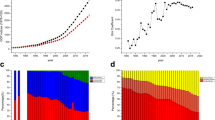Abstract
Homework is a commonly used and occasionally controversial teaching practice in our public schools (Center for Public Education, 2007). Meta-analyses indicate that homework has positive effects on student learning that are moderated by age, subject area, and student characteristics (Hattie in Visible learning, Routledge, New York, 2009). Unfortunately, many students do not complete homework or do so with less accuracy. The present study examined the effects of Radical Raceway, a multi-component intervention package on the homework completion and accuracy of a ninth-grade social studies inclusion class. Radical Raceway produced immediate and consistent improvements in all students’ performance, including 10 adolescents with Individualized Education Plans. Intervention effects were replicated across subsequent experimental phases, teachers reported that it was effective and easy to implement, and students rated intervention goals, procedures, and outcomes favorably. Implications for future research and practice are discussed.

Similar content being viewed by others
References
Bembenutty, H. (2010). Homework completion: The role of self-efficacy, delay of gratification, and self-regulatory processes. International Journal of Educational & Psychological Assessment, 6(1), 1–20.
Boekarts, M., & Corno, L. (2005). Self-regulation in the classroom: A perspective on assessment and intervention. Applied Psychology: An International Review, 54(2), 199–231.
Bryan, T., Burnstein, K., & Bryan, J. (2001). Students with learning disabilities: Homework problems and promising practices. Educational Psychologist, 36, 167–180.
Center for Public Education. (2007). What research says about the value of homework: At a glance. Retrieved from www.centerforpubliceducation.org on September 17, 2014.
Chafouleas, S. M., Briesch, A. M., Riley-Tillman, T. C., & McCoach, D. B. (2009). Moving beyond assessment of treatment acceptability: An examination of the factor structure of the usage rating profile—intervention (URI-I). School Psychology Quarterly, 24, 36–47.
Cooper, H. (1989). Homework. White Plains, NY: Longman.
Cooper, H. (2001). Homework for all—in moderation. Educational Leadership, 58, 34–38.
Cooper, H., Robinson, J. C., & Patall, E. A. (2006). Does homework improve academic achievement? A synthesis of research, 1987–2003. Review of Educational Research, 76, 1–62.
Epstein, M. H., Munk, D. D., Bursuck, W. D., Polloway, E. A., & Jayanthi, M. (1999). Strategies for improving home-school communication about homework for students with disabilities. Journal of Special Education, 33, 166–176.
Finn, C. A., & Sladeczek, I. E. (2001). Assessing the social validity of behavioral interventions: A review of treatment acceptability measures. School Psychology Quarterly, 16(2), 176–206.
Gajria, M., & Salend, S. J. (1995). Homework practices of students with and without learning disabilities: A comparison. Journal of Learning Disabilities, 28, 291–297.
Hattie, J. (2009). Visible learning. New York: Routledge.
Jenson, W. R., Rhode, G., & Reavis, H. K. (2009). The tough kid book: Practical classroom management strategies (2nd ed.). Eugene, OR: Pacific Northwest Publishing.
Kennedy, C. R. (2005). Single-case designs for educational research. Boston: Allyn & Bacon/Pearson.
Knorr, J. (2010, March). Radical raceway. A power point presentation for school psychologists who work with students with severe emotional disturbance. Salt Lake City, UT: University of Utah.
Lynch, A., Theodore, L. A., Bray, M. A., & Kehle, T. J. (2009). A comparison of group-oriented contingencies and randomized reinforcers to improve homework completion and accuracy for students with disabilities. School Psychology Review, 38(3), 307–324.
Madaus, M. M. R., Kehle, T. J., Madaus, J., & Bray, M. A. (2003). Mystery motivator as an intervention to promote homework completion and accuracy. School Psychology International, 24, 369–377.
Marzano, R. J., & Pickering, D. J. (2007). The case for and against homework. Educational Leadership, 64, 74–79.
Miller, D. L., & Kelly, M. L. (1991). Interventions for improving homework performance: A critical review. School Psychology Quarterly, 6, 174–185.
Moore, L. A., Waguespack, A. M., Wickstrom, K. F., Witt, J. C., & Gaydos, G. R. (1994). Mystery motivator: An effective and time efficient intervention. School Psychology Review, 23, 106–118.
Olympia, D. E., Sheridan, S. M., Jenson, W. R., & Andrews, D. (1994). Using student-managed interventions to increase homework completion and accuracy. Journal of Applied Behavior Analysis, 27(1), 85–99.
Paschal, R. A., Weinstein T., & Walberg, H. J. (1984). The effects of homework on learning: A quantitative synthesis. Journal of Educational Research, 78(2), 97–104. http://www.jstor.org/stable/27540101
Reinhardt, D., Theodore, L. A., Bray, M. A., & Kehle, T. J. (2009). Improving homework accuracy: Interdependent group contingencies and randomized components. Psychology in the Schools, 46(5), 471–488.
Shapiro, E. S., & Goldberg, R. (1986). A comparison of group contingencies in improving spelling performance across sixth grade students. School Psychology Review, 15, 546–559.
Sullivan, M. H., & Sequeira, P. V. (1996). The impact of purposeful homework on learning. Clearing House, 69(6), 346.
Theodore, L. A., DioGuardi, R. J., Hughes, T. L., Aloiso, D., Carlo, M., & Eccles, D. (2009). A class-wide intervention for improving homework performance. Journal of Educational & Psychological Consultation, 19(4), 275–299.
Trautwein, U. (2007). The homework-achievement relation reconsidered: Differentiating homework time, homework frequency, and homework effort. Learning and Instruction, 17, 372–388.
Xu, J. (2011). Homework completion at the secondary school level: A multilevel analysis. Journal of Educational Research, 104(3), 171–182.
Author information
Authors and Affiliations
Corresponding author
Rights and permissions
About this article
Cite this article
Houser, D., Maheady, L., Pomerantz, D. et al. Effects of Radical Raceway on Homework Completion and Accuracy in a Ninth-grade Social Studies Inclusion Class. J Behav Educ 24, 402–417 (2015). https://doi.org/10.1007/s10864-015-9229-9
Published:
Issue Date:
DOI: https://doi.org/10.1007/s10864-015-9229-9




